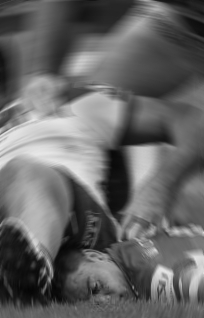Rugby study shows head risk
 A review of decades of data has found former international rugby union players have a 2.5 times higher risk of neurodegenerative disease.
A review of decades of data has found former international rugby union players have a 2.5 times higher risk of neurodegenerative disease.
According to 32 years of national health data in Scotland, the risk of neurodegenerative disease among former Scottish international rugby union players is more than double that of the general population.
The risk varies by condition, ranging from just over twice as high for dementia, up to 15 times as high for motor neurone disease, the findings show, prompting the researchers to call for strategies to cut the risks of head impact and traumatic brain injury across all sports, including in training.
Traumatic brain injury is a major risk factor for neurodegenerative disease and is thought to account for 3 per cent of all dementia cases.
In recent years post mortem studies of brain tissue have uncovered evidence of neurological disease uniquely associated with a previous history of traumatic brain injury or repetitive head impact exposure - termed chronic traumatic encephalopathy neuropathologic change (CTE-NC) - in former professional athletes from sports, including American football, soccer, and rugby union.
In their recent study, the researchers wanted to find out if the risk of neurodegenerative disease might also be higher among former rugby players than it is among the general population.
The most common causes of death among Scottish men - circulatory system disease; respiratory disease; and cancer - were used to track the health and survival of both groups for an average of 32 years from the age of 30 onwards.
The chance of being diagnosed with a neurodegenerative disease was more than twice as high among the former rugby players (47; 11.5 per cent) than it was among the comparison group (67; 5.5 per cent), although risks varied by condition.
The risk of a dementia diagnosis was just over twice as high, while that of Parkinson’s disease was three times as high, and that of motor neurone disease/amyotrophic lateral sclerosis 15 times as high.
The findings echo those of previous studies of former professional soccer players and former American footballers, say the researchers.
“Notably, in contrast to data from the NFL [National Football League] and soccer, our cohort of rugby players largely comprises amateur athletes, although participating at an elite, international level. In this respect, it is the first demonstration that high neurodegenerative disease risk is not a phenomenon exclusive to professional athletes,” the researchers point out.
The study adds to the growing evidence of the dangers of contact sports and repeated head injuries especially those leading to concussion or loss of consciousness.
The full paper is accessible here.








 Print
Print